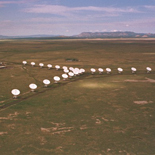
Very Large Array (NRAO/AUI)
UGS - Spring 2010
EXTRATERRESTRIAL LIFE
Unique Nos. 63985, 63990, 63995, 6400, 64005, 64010, 64105, 64020, 64025, 64030, 64035, 64040
Professor
RLM 15.204 · (512) 471-6446 (office), 478-2748 (home) · email
Courses - Spring '10 | Course Website
Supplementary reading: I suggest you do not purchase or otherwise obtain materials for this course from another book, since there are a large number of books that appear to be about the same subject, but almost invariably are popularizations that are not useful and will even be confusing. You will encounter additional material from the assignment to monitor an astrobiology web site, which will also add some visual content to each part of the course. So subscribe to www.astrobio.net.
Assignments and grading: Your grade will be based on five exams (70%), a research paper (15.4%), a short report on a visit to a UT resource (to be explained later, 5%), discussion class participation, including attendance (5%), and an oral presentation to be given in discussion section (5%). A long list of potential topics for the research paper will be given separately. There will be a sufficient variety that everyone should be able to find something of interest.
Exams: All exams will consist of about 20-40 multiple choice questions, and will be weighted equally, except that your
lowest exam score will only receive a weight of ½ compared to the others. So you have to take all the exams, but if you
have an off day (or week, etc.) it won’t hurt your final grade too much. Because the textbook contains no end-of-chapter
questions, a sample of potential questions will be sent to you before each exam. I will try to prepare you for the nature of
the exam questions by occasionally giving sample questions during lectures, by trying to point out the types of information
that I expect you to understand or remember, and giving examples on review sheets.
Exam dates will be given in the next edition. Exams are given during a lecture period (MWF 9-10).
There will be no comprehensive final.
In case of medical or other non-academic emergencies or situations, contact me as early as possible--it will usually be possible for you to take an exam a day or so early or late, but not more.
We will try to get exam grades available to you through the UT eGradebook system. Often we can get these to you within a day of the exam.
The material in this course will be almost entirely non-mathematical, concentrating on a number of key ideas that can be understood without math, although they do require a solid conceptual grasp of the subjects, and a degree of comfort using graphs as an important quantitative tool. You will be required to become familiar with a lot of elementary but diverse material from astronomy, chemistry, and a bit of geology and cell biology. This material requires no background, nor gives any advantage to those who do have some background--it is really at an elementary level. A positive way to view the variety of topics is as a primer for courses you have yet to take. The mathematical level is somewhat higher in your textbook, where several key points are made clear by a simple calculation. I will let you know which, if any, formulas I expect you to understand, but very few exam questions will require manipulation of equations or numbers.
Homework: Besides the assignments, there will be homework questions assigned. The homework in this class will be ungraded until your exam, where you will see some or all of the homework assignments as multiple choice questions. Usually once per week (or so) I will send out class email containing one or more questions relating to the topic we are covering. You should try to answer these (for yourself, not to me or to the TA) within a day or two of receipt of the email. Most of these questions will be basic and fairly easy, and serve the purpose of having you keep up with the reading and lectures (lagging on these is the most common cause of grade decline); some will involve searching the internet concerning developments too recent to be covered in your text. An example is the possibility that an Earth-like planet will be discovered in within the present semester, since there are currently space-borne planet detection missions that didn’t exist at the time your textbook was written. Whether you have done your homework and how well will be found by corresponding questions that will appear on the exams. Some of these will serve as topics for the discussion sections.